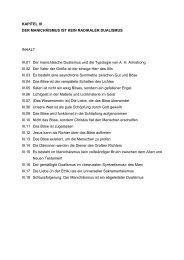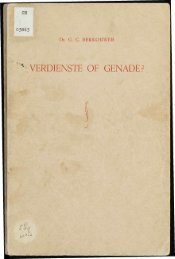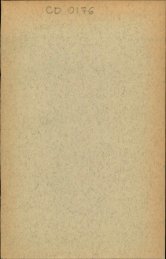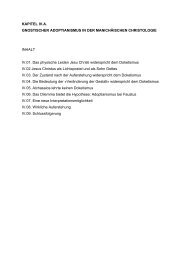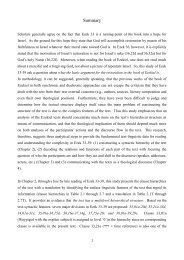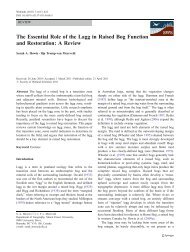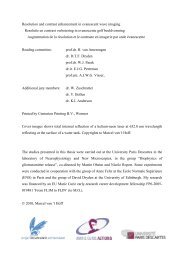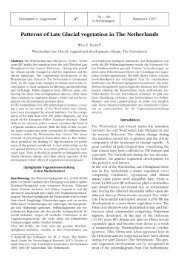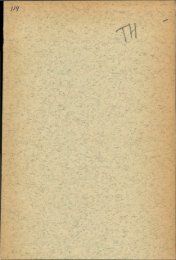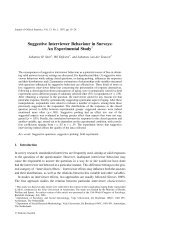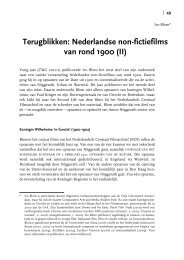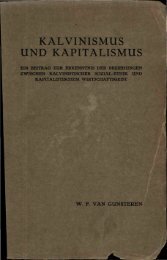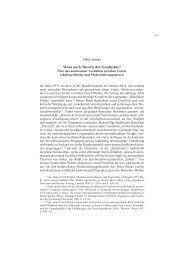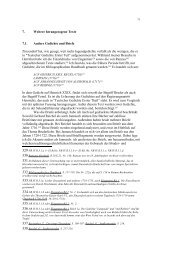- Page 1 and 2:
Table of Contents Introduction 2 Ap
- Page 3 and 4:
Bible Westerlo used, I chose the co
- Page 5 and 6:
Appendix 1 The Memoirs of Eilardus
- Page 7 and 8:
Heiligen Doop van mijnen Eigenen Va
- Page 9 and 10:
gerust te worden, tot ’t Heiligdo
- Page 11 and 12:
X. De voorige snede is met zooveel
- Page 13 and 14:
meeren niet slegts naar buiten, maa
- Page 15 and 16:
spreken, prediken en andere dingen
- Page 17 and 18:
leven voor Jesus, totdat ik voor ee
- Page 19 and 20:
Memoirs 2: 1774 Westerlo, E. 1774.
- Page 21 and 22:
voorleezen van Vermeer’s Oeffenin
- Page 23 and 24:
van en briefwisselinge met Mrs. Liv
- Page 25 and 26:
in Christus Jesus, dat er immer een
- Page 27 and 28:
armhartigheid min of meer opgewekte
- Page 29 and 30:
meer daar de vijand naar ’t noord
- Page 31 and 32:
zegenden dienst, en laat mij nog nu
- Page 33 and 34:
leven uit de dooden. Laat uw genade
- Page 35 and 36:
influence of Thy Divine Spirit, tha
- Page 37 and 38:
October ’82 12. Tomorrow 22 years
- Page 39 and 40:
December ’82 14. Blessed be the n
- Page 41 and 42:
scene of a bloody war. Oh, may sinn
- Page 43 and 44:
for repeated and renewed mercies. H
- Page 45 and 46:
N.B. This morning I read Henry’s
- Page 47 and 48:
12. Yesterday the Lord strengthened
- Page 49 and 50:
concerning my son. I desire through
- Page 51 and 52:
may they be pitied and pardoned, an
- Page 53 and 54:
30. This morning again hindered by
- Page 55 and 56:
in peace and the consolations of th
- Page 57 and 58:
and every individual, with precious
- Page 59 and 60:
the many deliverances, mercies, and
- Page 61 and 62:
country 114 (which, however, was al
- Page 63 and 64:
desire to kiss Thy Rod. 116 Pardon
- Page 65 and 66:
March ’84 13. This day my younges
- Page 67 and 68:
at the Mills. 132 I desire to ackno
- Page 69 and 70:
6. This morning I preached from Eph
- Page 71 and 72:
Dominee Doll 163 ’s family. Last
- Page 73 and 74:
26. Last week the Groote Kerkeraad
- Page 75 and 76:
magistrates would protect me, yea,
- Page 77 and 78:
God in Christ Jesus for supporting
- Page 79 and 80:
salvation. Father of mercies, I tha
- Page 81 and 82:
23. Through many weaknesses I have
- Page 83 and 84:
humbly commend to Thy Fatherly care
- Page 85 and 86:
May ’85 3. This morning our Joann
- Page 87 and 88:
me, and prosper all Thy servants in
- Page 89 and 90:
conversation, pardon our sins, and
- Page 91 and 92:
service and become strong again thr
- Page 93 and 94:
speak peace to our souls, forgive o
- Page 95 and 96:
other accounts, which I humbly pray
- Page 97 and 98:
full of compassion. Pity, Father of
- Page 99 and 100:
20. Blessed be the Lord for His aid
- Page 101 and 102:
dislocation of her shoulder last wi
- Page 103 and 104:
ought to my mind, and gave me both
- Page 105 and 106:
them of both denominations to apply
- Page 107 and 108:
service of His Sanctuary, by preach
- Page 109 and 110:
Thou knowest to be best for us, and
- Page 111 and 112:
had thoughts of mercy towards me, a
- Page 113 and 114:
pains. A sermon, however, of Hellen
- Page 115 and 116:
supply of wisdom, prudence, patienc
- Page 117 and 118:
gracious Lord and faithful Savior J
- Page 119 and 120:
and partakers of the graces and spi
- Page 121 and 122:
12. Yesterday morning my throat was
- Page 123 and 124:
ut Jesus Christ and Him crucified!
- Page 125 and 126:
a man of God be called to help me a
- Page 127 and 128:
and to receive every moment fresh s
- Page 129 and 130:
may my poor labors succeed for Zion
- Page 131 and 132:
we be enabled to trust in the Lord.
- Page 133 and 134:
serious, simple, but also acceptabl
- Page 135 and 136:
Thou in the midst of them, and suff
- Page 137 and 138:
good word and work. I have also per
- Page 139 and 140:
of mercies, hear my prayer, and pit
- Page 141 and 142:
property, which probably was the fi
- Page 143 and 144:
enquire at Schodack whether they ha
- Page 145 and 146:
live also. 358 May Thy life be made
- Page 147 and 148:
usiness, which was conducted, I hum
- Page 149 and 150:
y every student, agreeable to the f
- Page 151 and 152:
and may piety with righteousness pr
- Page 153 and 154:
and defend Thy cause. Remember all
- Page 155 and 156:
they have read, and then to repeat
- Page 157 and 158:
graciously to bless this medicine,
- Page 159 and 160:
unto Him, and o, blessed Jesus, may
- Page 161 and 162:
sent for Dr. Schuyler, 399 who prep
- Page 163 and 164:
wished. However, may I become more
- Page 165 and 166:
at Groningen. Oh, what shall I rend
- Page 167 and 168:
for the preservation of internal pe
- Page 169 and 170:
all the innumerable bounties of mer
- Page 171 and 172:
and to wait for His blessing and me
- Page 173 and 174:
efuge to the Lord Jesus Christ, in
- Page 175 and 176:
ingratitude, and return in mercy to
- Page 177 and 178:
September ’88 3. Last Lord’s Da
- Page 179 and 180:
proper persons to try, and then, if
- Page 181 and 182:
Wicked One, and I come off more tha
- Page 183 and 184:
nursery of learning and piety for o
- Page 185 and 186:
16. Thanks to the Lord for His aid
- Page 187 and 188:
more fortitude and faith and pruden
- Page 189 and 190:
N.B. The last verse of Psalm 91, 49
- Page 191 and 192:
me to perform the duties of that da
- Page 193 and 194:
Zion’s prosperity be pure, peacea
- Page 195 and 196:
comfortable sayings. But, Thou, o L
- Page 197 and 198:
e followed by His blessings upon th
- Page 199 and 200:
services for the prosperity of Zion
- Page 201 and 202:
my sins and shortcomings. O Lord, m
- Page 203 and 204:
August ’89 4. Thanks to the Lord,
- Page 205 and 206:
unto Him. The Lord deliver me from
- Page 207 and 208:
would I serve Thee and Thy people i
- Page 209 and 210:
8. Thanks to the Lord for the light
- Page 211 and 212:
ecome more and more glorious, and G
- Page 213 and 214:
chasten me above measure, though I
- Page 215 and 216:
1790 January ’90 21. Blessed be t
- Page 217 and 218:
unto my soul. Preserve me, both fro
- Page 219 and 220:
and all other institutions for the
- Page 221 and 222:
This afternoon my dear friend Ariaa
- Page 223 and 224:
standing exposed to the cold, may i
- Page 225 and 226:
sanctify the parents, and may the m
- Page 227 and 228:
peace upon Israel, peace in our pub
- Page 229 and 230:
Lord’s Supper! Oh, may the Lord J
- Page 231 and 232:
adversity, waiting for mercy, grace
- Page 233 and 234:
enabled to trust in the Lord, with
- Page 235 and 236:
and uncommon knowledge of the Chris
- Page 237 and 238:
the Lord may continue His mercies t
- Page 239 and 240:
Appendix 2 Books in Westerlo’s Co
- Page 241 and 242:
O86. Allestree, Richard (1619-1681)
- Page 243 and 244:
Leiden: Cornelis Boutesteyn and Jor
- Page 245 and 246:
Balthasar Christofor Wust. 1672. Vo
- Page 247 and 248:
Sudantis, Specimen, de Nature Theol
- Page 249 and 250:
Marten Schagen, Adriaan Wor, Erven
- Page 251 and 252:
‘Ecloga Dissertationum Theologico
- Page 253 and 254:
- Huys-bybel over de Brieven van Pa
- Page 255 and 256:
Triplicem Judæorum Statum, Ecclesi
- Page 257 and 258:
Hoorn. 1718. Translated by Jacob Sc
- Page 259 and 260:
Q61. Musnai, Mihály (ca.1658-after
- Page 261 and 262:
Sacrae Variis Observationibus Copio
- Page 263 and 264:
Causis & Auxiliis Interpretandi Lin
- Page 265 and 266:
Linguae Sanctae I. Veteris Testamen
- Page 267 and 268:
Overeenstemming der Andere Heilige
- Page 269 and 270:
Verlossing van des Heeren Volk uit
- Page 271 and 272:
Uitgelezene Bibel-deelen, des Ouden
- Page 273 and 274:
2. Books having belonged to Eilardu
- Page 275 and 276:
P4. Episcopius, Simon (1583-1643),
- Page 277 and 278:
Dooden. [...] Sophia Dorothea en Ha
- Page 279 and 280:
Goede Vrienden vervat. Amsterdam: P
- Page 281 and 282:
Verstant van den Doemwaerdigen Zond
- Page 283 and 284:
Christen,Onderrigt en Bemoedigt, do
- Page 285 and 286:
Inserted at Large in Distinct Parag
- Page 287 and 288:
Appendix 3 Manuscript sources This
- Page 289 and 290:
see Appendix 10] May 19, 1784 Eilar
- Page 291 and 292:
Rensselaer December 31, 1789 John B
- Page 293 and 294:
Appendix 4 Eilardus Westerlo’s Wi
- Page 295 and 296:
Genealogy Drawn up Before May 6, 17
- Page 297 and 298:
Grootvader en grootmoeder van moede
- Page 299 and 300:
emonstrantieschrijver zig zelven ee
- Page 301 and 302:
wij verdiend hebben, van onzen vert
- Page 303 and 304: weinig waard en zijn stekelijke red
- Page 305 and 306: genoeg gegaan te zijn, want men had
- Page 307 and 308: 2. Remonstrantie Aen de Predikant,
- Page 309 and 310: Subordinatie tot het burgerlijke of
- Page 311 and 312: daer toe hadden, te compereeren de
- Page 313 and 314: 3. Bijvoegzel Omtrend den briev der
- Page 315 and 316: Appendix 6 Letter by Eilardus Weste
- Page 317 and 318: waarin t’ effens ‘t ontwerp in
- Page 319 and 320: overnemen, zonder daarin wezenlijk
- Page 321 and 322: van daar voor onze gemeentens afged
- Page 323 and 324: als van een generale ofte Nationale
- Page 325 and 326: Wij zien dus met onze eigen oogen,
- Page 327 and 328: ook zelve te promoveeren, en t’ef
- Page 329 and 330: 8. Brooklyn, NY (1654) Ulpianus Van
- Page 331 and 332: 34. Kingston, NY (1659) George W. G
- Page 333 and 334: 61. Readington, NJ (1719) Jacob R.
- Page 335 and 336: Dutch Reformed Churches in New York
- Page 337 and 338: John G. Gebhard 1783-1807 Hyde Park
- Page 339 and 340: Tappan, NY (1767) 704 David Marinus
- Page 341 and 342: 12 children, among whom: 3. Catheri
- Page 343 and 344: 1. Catherine Van Rensselaer (1803-1
- Page 345 and 346: Psalm 42:11 8 June 1789 Sermon Alba
- Page 347 and 348: Ezekiel 22:8 17 January 1770 Quotat
- Page 349 and 350: John 17:19 4 March 1788 Quotation J
- Page 351 and 352: Hebrews 1:3-4 25 August 1788 Sermon
- Page 353: Appendix 10 Eilardus Westerlo’s J
- Page 357 and 358: his share; when it was necessary to
- Page 359 and 360: common prosperity of the whole to t
- Page 361: On the cover: Pulpit in the Albany



